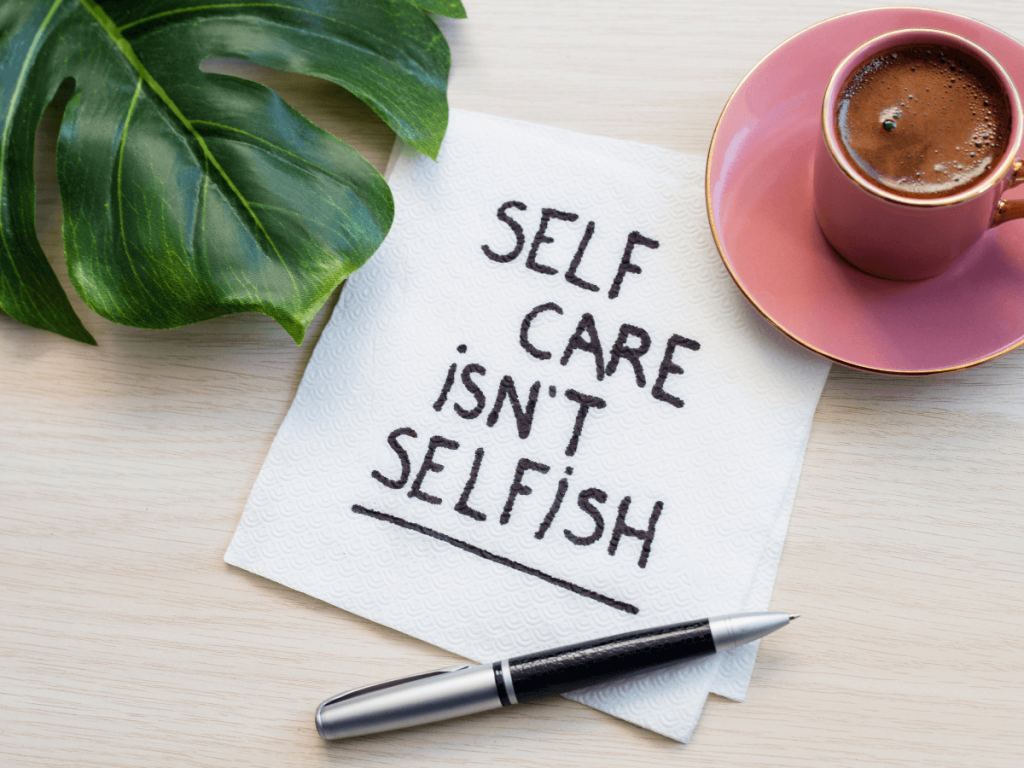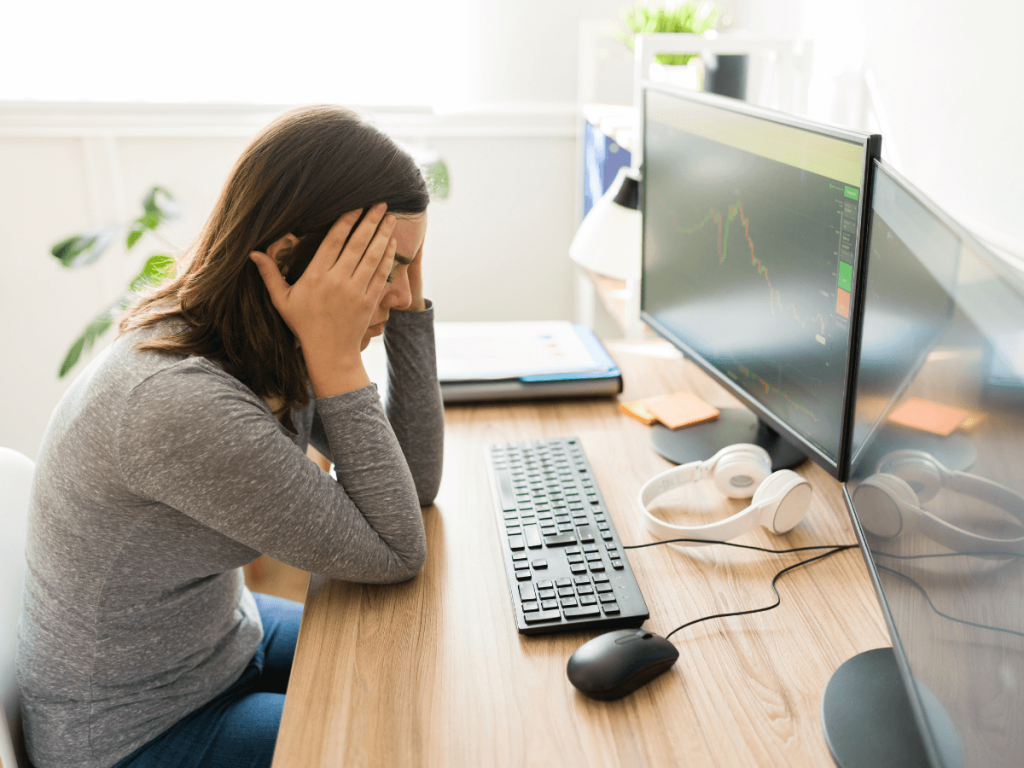
I’ve gone through my fair share of major transitions in life—moving from Slovenia to the UK or transitioning from student to agency worker to entrepreneur—a journey more like off-roading than a smooth highway.
If I could go to my younger self, I would have one message. “You are putting too much pressure on yourself. It’s a marathon, not a sprint.”
I had to learn this the hard way. I cannot give 100% all the time and most definitely not 100% to 5 things. Somewhere between external pressures, doubting my inner compass for rest and extensive coaching, I managed to switch around my priorities from “me” being at the bottom to the priority. I started putting more time for rest, walks in nature, music and dancing which helped me unlock more resilience, self-acceptance and happiness.
This journey revealed that self-care isn’t a luxury; it’s a necessity amidst the chaos.
Understanding the challenge
The most common reasons why self-care is a challenge are priorities, guilt, people pleasing, time & energy and self-awareness. This makes building new habits difficult.
Overemphasis Towards Results and Productivity
Under-resourced teams, multitasking, and lofty sales or innovation targets can create a challenging environment akin to a hamster wheel for many employees.
In the quest to meet these demanding expectations, our focus on well-being often takes a backseat. The pressure to deliver can lead to a cycle of neglecting personal well-being in favour of meeting external demands, especially when this pressure is present over a long period.
Think of the past month whilst you answer the below questions to establish whether you prioritise results and productivity over self-care:
- How often do you feel pressure to achieve specific results or targets in your work environment?
- How many priorities do you have on a day-to-day basis? Do you have tasks that are not a priority and are they also being done?
- How often do you have lunch at your desk, cut off coffee time or skip breaks? How often do you do overtime?
- How has this impacted your overall sense of balance and satisfaction?
- Do the expectations align with your personal and professional values?
- How does this alignment—or lack thereof—affect your motivation and engagement in your work?
Feeling Guilty Over Putting Yourself First
Guilt is a complicated emotion and is sometimes confused with shame. In essence, we feel guilty when we think we’ve done something wrong or when we couldn’t do something that we were responsible for.
In this case, putting ourselves first feels wrong because there is a sense that other responsibilities and expectations are more important. For example, we prioritise finishing the task because we feel that’s more important than taking a break, even though we were at it for 3 hours.
Much like the previous point, external expectations can occasionally create the illusion of being “realistic,” masking the fact that they stem from a chain of demanding requests to meet targets. Consequently, employees may find it challenging to assert themselves to push against deadlines or feel a sense of responsibility to resolve issues at the cost of their well-being.
There might even be a lingering guilt for not being able to accomplish it all within the designated work hours. Think of the past month whilst you answer the below questions to establish whether guilt prevented you from taking care of yourself:
- How often do you feel pressure to achieve specific results or targets in your work environment?
- How many priorities do you have on a day-to-day basis? Do you have tasks that are not a priority and are they also being done?
- How often do you have lunch at your desk, cut off coffee time or skip breaks? How often do you do overtime?
- How has this impacted your overall sense of balance and satisfaction?
- Do the expectations align with your personal and professional values?
- How does this alignment—or lack thereof—affect your motivation and engagement in your work?
People-Pleasing Tendencies
We are social creatures and we need a community in which we want to coexist. Recognizing and responding to the needs of those around us strengthens bonds. However, when this inclination turns into consistently prioritising others at the expense of our well-being, we compromise fulfilling our own needs.
Reflect on the past month to see whether you’ve prioritised others over your well-being:
- How often do you accommodate other’s requests or expectations at your own expense?
- How often and when did saying “no” to tasks, commitments or requests feel challenging?
- How did this impact your time and energy for self-care?

Well-Being Seems Too Complicated
Engaging in activities for our well-being may seem straightforward when perusing a list of self-care practices—taking a walk, reading a book, or treating ourselves to a spa day. On the surface, these suggestions appear simple enough.
The complexity comes in when we add a whole lot of life to it e.g. work, friends, family. Perhaps we already spend all our available energy on work or loved ones, so doing something for us seems a bit too much. All of a sudden, lying in bed and scrolling TikTok feels much more appealing.
Reflect on the past month to see whether you’ve had enough time and energy to focus on your well-being:
- How do you typically manage stress, and does your stress level impact your energy for self-care?
- How often do your commitments leave you feeling drained and low on energy?
- How successful are you in maintaining a balance between your personal and professional life, ensuring that neither aspect excessively depletes your energy?
- Reflecting on your recent sleep patterns, do you generally wake up feeling refreshed and energised?
- Reflect on your use of technology, such as social media or screen time, especially when seeking relaxation. How does this impact your overall energy and well-being?
- What activities have helped you feel energised?
We Don’t See How Depleted We Are
This one is personal to me. When difficult periods hit, we often run on adrenaline and we just try to solder through it as best as we can. We find that resilience and become hyper-focused on getting out on the other end. I’ve certainly made this a bad habit of mine. The downside is that we crash when we are out on the other side.
Think of the past month to reflect how much awareness you have around your well-being:
- How often in the day do you check your energy level?
- How do you know you are in your content/happy/rest level?
- What signs signal to you that you are going towards burnout?
- Were there moments in the past month when we felt physically or emotionally depleted?
- What could you put in place to start improving your energy levels? What can you put in place to maintain the habits?
What can we do about it?

Recognize the Patterns and Excuses That Hinder Your Self-Care Journey
Awareness is the first step in breaking free from habits that prioritise productivity over well-being. Acknowledge the tendencies and narratives that keep you from embracing self-care.
Internalise the Impact of Self-Care on Your Overall Well-Being
Self-care is not just a luxury; it’s a necessity. Recognize that prioritising self-care is an investment in your mental and physical health. Internalising this importance creates a powerful motivation for consistent well-being practices.
Start With Simple, Manageable Steps
Begin by incorporating small, enjoyable activities into your routine. These initial steps set the foundation for building sustainable self-care habits. Simplicity, in the beginning, ensures a smoother transition into a well-rounded well-being routine.
Ask For Help
Seeking support from friends, family, or professionals can provide valuable insights and encouragement. Building a network of support creates a positive environment for prioritising self-care, making the journey more fulfilling and effective.
Notice and Address Feelings of Guilt and Shame Associated With Self-Care
Understand that these emotions may stem from societal expectations or internalised beliefs. Reframe guilt by recognizing that prioritising self-care isn’t selfish; it’s an essential aspect of maintaining balance and overall well-being.
Build Clear Boundaries Between Activities That Drain and Energise You
Recognize the activities that contribute positively to your well-being and those that deplete your energy. Establishing and preserving these boundaries ensures that you allocate time and energy to activities that promote overall health and happiness.
Conclusion
Self-care is about prioritising oneself by carving out time from stress-inducing activities. It is not a luxury but a transformative lifeline. Through self-care, you can build resilience, self-acceptance and happiness, thus creating the space for a more intentional living.
However, building self-care habits can be challenging because we don’t have time, feel guilty about putting ourselves first or think it’s much more complex than it is.
Ready to transform your life? Let’s conquer your challenges together! Book your free introductory call or email me at contact@janjaport.com. Your journey to unstoppable confidence and satisfaction starts now.
